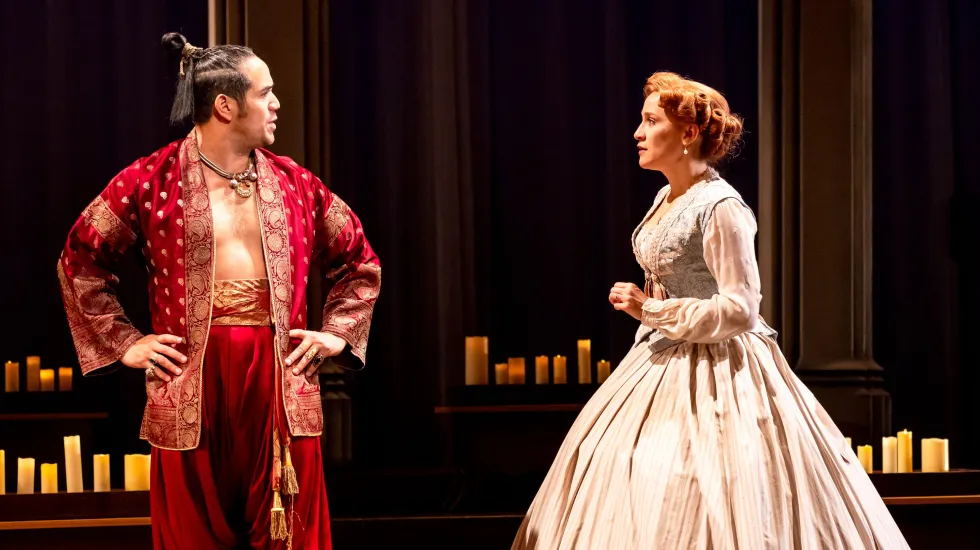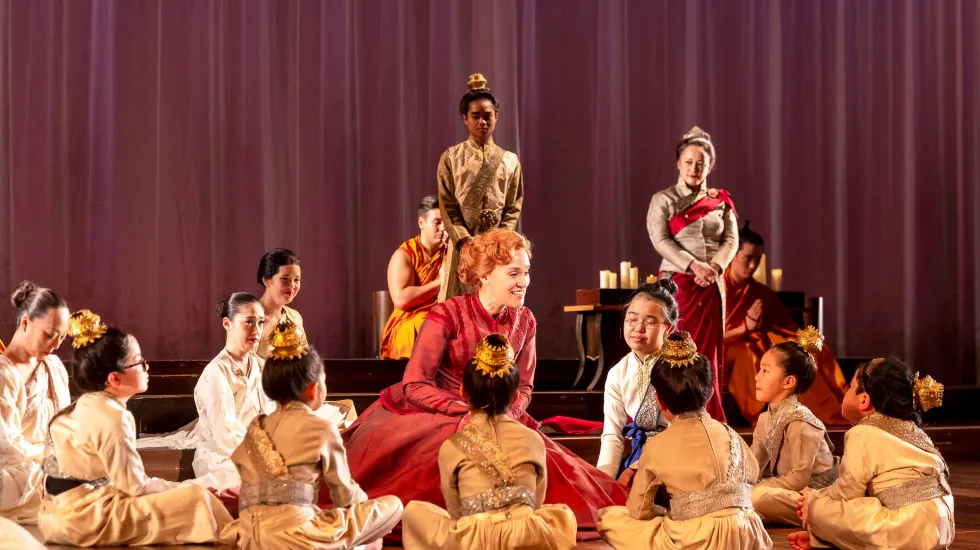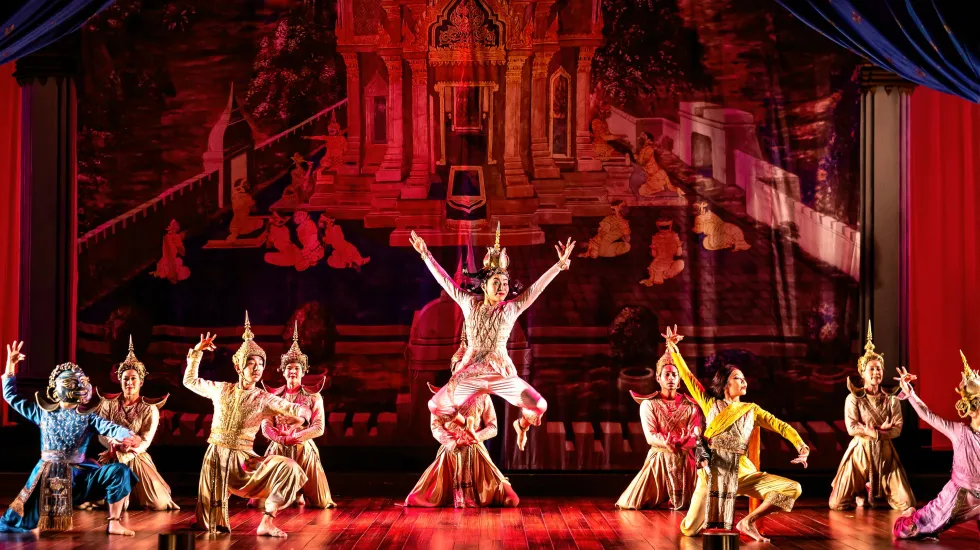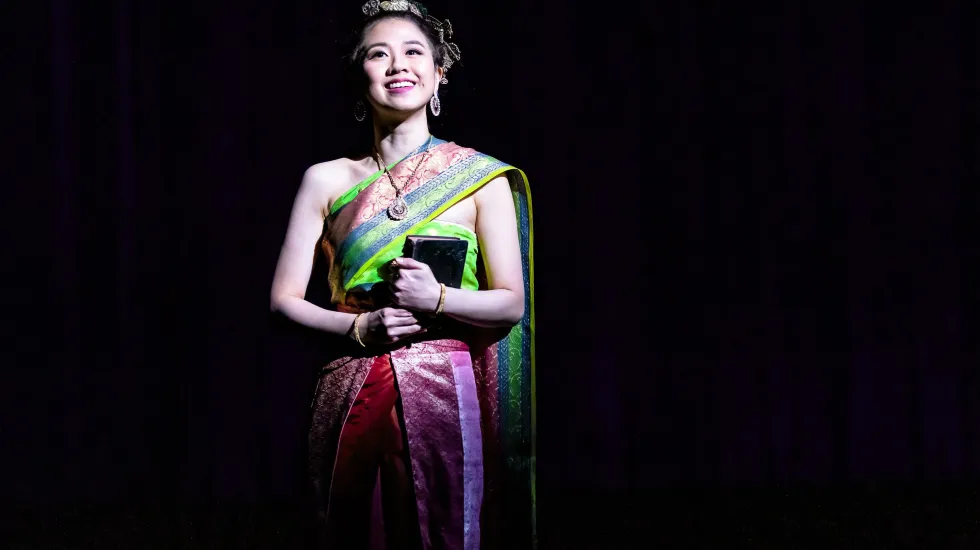
Traditionalists will find much to love in Drury Lane Theatre’s sonically and visually sumptuous production of “The “King and I.”
Director Alan Paul’s staging of the Richard Rodgers (music) and Oscar Hammerstein (book and lyrics) musical looks lavish and sounds splendid. That iconic score — including “Hello, Young Lovers,” “Getting to Know You” and” “Shall We Dance” — is delivered with robust vocals and choreography rich in gorgeous pageantry.
But you can’t talk about this 71-year-old musical set in 1860s Siam (Thailand today) without addressing its issues with race and gender, neither which can possibly be wholly unpacked within the constraints of a review. Suffice to say that the 1956 movie, which closely follows the musical, is banned in Thailand (so is the 1996 reboot) because both were considered a dismissive and inaccurate portrayal of Thai culture.
When: Through May 22
Where: Drury Lane Theatre, 100 Drury Lane, Oakbrook Terrace
Tickets: $64-$79
Run-time: 2 hours and 45 minutes, including one intermission
Info: DruryLaneTheatre.com
The show has also been condemned in the past for using yellow face — casting white actors as Southeast Asian characters — including the King (most famously Yul Brynner in the 1956 film version) and his various wives.
Drury Lane’s ensemble and its design team show significant progress in both inclusive casting and amplifying the culture of story’s setting. Darren Leet’s choreography uses dance vocabulary rooted in Southeast Asia. Wilson Chin and Riw Rakkulchon’s set design is defined by the distinctive architecture of stupas, the gracefully triangular Buddhist shrines.
The plot centers on Anna Leonowens, a Welsh school teacher hired by King Mongkut of Siam in the early 1860s to teach his children Western ways, including the English language. Rodgers and Hammerstein based their 1951 musical on Margaret Landon’s semi-fictionalized novel “Anna and the King of Siam,” which was inspired by Leonowens’ memoirs.
Anna is soon beloved by the children and exasperated by the King, particularly his tyrannical insistence on slavish, unthinking devotion. As they so often do in musicals, opposites attract, and the sexual tension and mutual admiration that grows between Anna and the King is palpable in Betsy Morgan and Adam Jacobs’ feisty, fraught banter and well-matched, soaring vocals.
A subplot involving the young, enslaved Burmese woman Tuptim (Paulina Yeung) and her lover Lun Tha (Ethan Le Phong) gives the production a somber edge that gleams like a knife even when Leet’s intricate, mesmerizing choreography and costume designer Izumi Inaba’s intricate royal garb (based on the original costume design by Catherine Zuber) are at their glittering, opulent best.

Director Paul emphasizes the show’s inherent complexities. Jacobs’ King, for example, is a savvy political operator of keen intellect and boundless curiosity. Hiring Anna, the King makes clear early on, isn’t just about teaching his children. It’s about using Anna as a tool in deciphering how to deal with the incursion of powerful Western influences.
While the King is imperious, Jacobs keys into his self-doubts with “A Puzzlement,” the lament of someone trying mightily to adapt to a world changing at a dizzying pace.
Rodgers and Hammerstein use the musical to condemn slavery, through Tuptim’s “adaptation” of Harriett Beecher Stowe’s “Uncle Tom’s Cabin,” which is performed for the King and the British dignitaries he hopes to impress. Here, slave owners are masked monsters, and a glittering, beneficent Buddha intervenes to save their unwilling chattel.
One of most powerful scenes in Paul’s production occurs when Tuptim goes off-book with “Small House” and delivers a harrowing condemnation of forced marriage. Some sopranos are silvery. Yeung’s is rage-red, a sweep of fiery defiance that colors both the ballet and the Act I duet “We Kiss in the Shadows” with Le Phong. The ballet itself, led by Kristine Bendul’s captivating, endlessly expressive Eliza, is truly exquisite.

Crucially, music director Tim Laciano and his live orchestra do right by Rodgers’ canonical score. It sounds marvelous, from the stratospheric, operatic heights that Lady Thiang (Christine Bunuan) reaches in “Something Wonderful” to the sweeping romance of that sure-fire audience pleaser, “Shall We Dance” to the playfully, ever-adorable “March of the Siamese Children.”
Speaking of the children: Matthew Uzarraga is memorable as Prince Chulalongkorn, eldest son of the King and an adolescent just catching wind of the fact that the all-powerful don’t actually know everything. He’s charismatic and funny and will be eminently relatable to anyone who has ever been exasperated by their parents.








